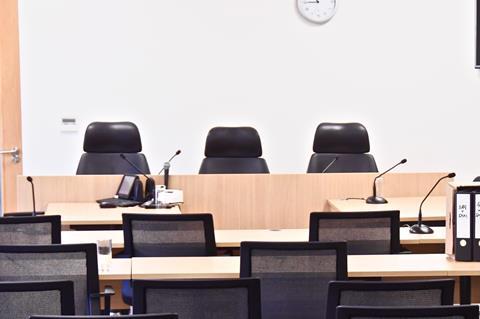The Solicitors Disciplinary Tribunal has barred the naming of clients behind an alleged strategic lawsuit against public participation (SLAPP) in order to protect legal privilege.
Christopher Mark Hutchings, of London firm Hamlins LLP, is alleged to have made assertions which were false and/or misleading in a telephone call with a practitioner identified as 'Solicitor G' in October 2018. In the call, the Solicitors Regulation Authority claims Hutchings said he had spoken to counsel and been told his client had a strong case for bringing contempt proceedings, or words to that effect. Hutchings, admitted in 1992, denies all wrongdoing.
At a case management hearing today, the SDT approved a jointly submitted anonymity schedule containing 20 names and 81 dates. It said some parts of the case - concerning a consent order, a telephone call and its aftermath - would need to be heard in private.
Paul Ozin KC, for the SRA, said: ‘To be clear, we are not suggesting that anonymity should be imposed so as to protect the reputation of any individual. It is being applied for to protect privilege, as privilege will be undermined if there is identification of the clients concerned.
‘The case law establishes open justice principles must give way to privilege, which is absolute, where necessary and in the interests of justice.’

'We say that the risk of jigsaw identification is substantial,' Ozin explained. 'Given the prominent public profile of the event in question and the public involvement of the individuals concerned in those events.'
Ben Hubble KC, for Hutchings, argued jigsaw identification could cause ‘prejudice’ to Client A, because Client B had made a ‘false and defamatory’ allegation against him.
‘It would be particularly unfair for Client A to be exposed to the risk of being associated with a false allegation in a public forum’, Hubble said.
The barrister argued that any evidence that relates to or involves consideration of the underlying events of the litigation would have to be heard in private.
It would be unfair for Hutchings to give evidence on these matters in public, Hubble said, pointing out he would be ‘on the one hand trying to defend his professional reputation, on the other he is trying to avoid a slip of the lip which might result in his former client’s name being revealed.’
Panel chair Nicholas approved the anonymity schedule put forward by the parties, stressing the order was ‘made to protect professional privilege’.
The case is the second case of SLAPP-type behaviour to reach the tribunal. A substantive hearing is listed for October this year.






























